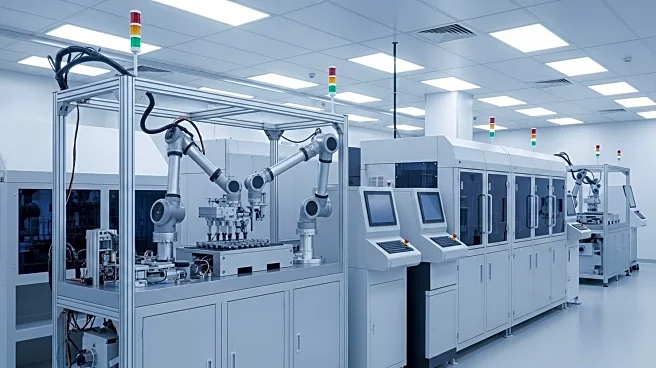What is the story about?
What's Happening?
The Trump administration is set to request that chip companies manufacture an equivalent number of semiconductors in the United States as their customers import from overseas producers. This move is part of a broader strategy to bolster domestic manufacturing and reduce reliance on foreign semiconductor production. The administration's plan aligns with its ongoing efforts to strengthen U.S. technological infrastructure and ensure national security by minimizing dependency on foreign supply chains. Additionally, President Trump has announced new tariffs on imported goods, including 100% duties on branded drugs and 25% tariffs on heavy-duty trucks, which are scheduled to take effect next week.
Why It's Important?
The administration's demand for increased domestic semiconductor production is significant for the U.S. technology sector, which heavily relies on foreign-made chips. By encouraging local manufacturing, the policy aims to enhance the resilience of the U.S. tech industry against global supply chain disruptions. This initiative could lead to increased investment in domestic semiconductor facilities, potentially creating jobs and boosting the economy. However, it may also result in higher production costs for companies, which could be passed on to consumers. The new tariffs on imported goods further reflect the administration's protectionist stance, which could impact international trade relations and lead to retaliatory measures from affected countries.
What's Next?
The semiconductor industry and related stakeholders are likely to respond to the administration's demands with strategic adjustments, including potential investments in U.S.-based manufacturing facilities. Companies may seek partnerships or collaborations to meet the new production requirements. The tariffs on imported goods are expected to prompt discussions among trade partners and could lead to negotiations or disputes in international trade forums. Businesses affected by the tariffs may explore alternative sourcing strategies or advocate for policy changes to mitigate the impact on their operations.
Beyond the Headlines
The push for domestic semiconductor production raises questions about the long-term sustainability of such policies in a globalized economy. While the initiative aims to enhance national security, it may also challenge the principles of free trade and open markets. The potential shift in production dynamics could influence global semiconductor supply chains, prompting other countries to reassess their own manufacturing strategies. Additionally, the tariffs on imported goods could have broader implications for consumer prices and market competitiveness, affecting various sectors beyond technology.
















